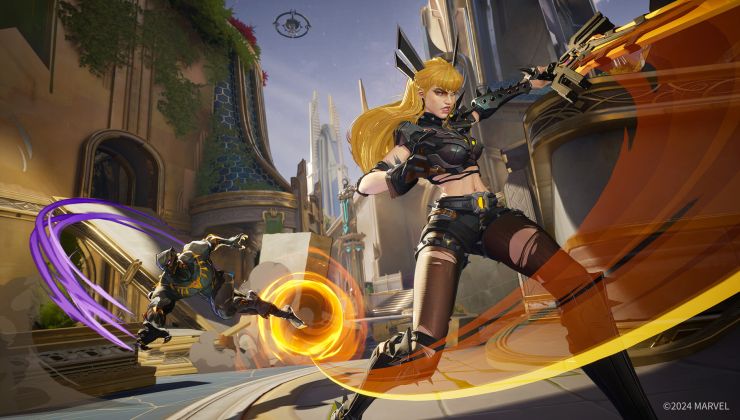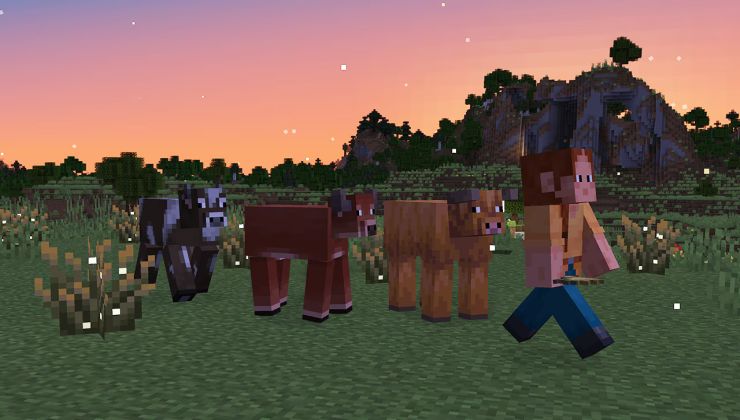By now you've probably heard either through us in our previous article or elsewhere that Valve are cooking something up to help Linux gaming even further. We have an idea on what one part of it is.
Valve already do quite a lot. There's the Steam Play Proton compatibility layer, the new container runtime feature to have Linux games both natively supported and Windows games in Proton run through a contained system to ensure compatibility, their work on Mesa drivers and much more.
In Valve's review of Steam in 2020 that we covered in the link above, one thing caught our eye and has been gaining attention. Valve mentioned for 2021 they will be "putting together new ways for prospective users to get into Linux gaming and experience these improvements" so what exactly does that mean? Well, a part of that might have already been suggested directly.
Back in November 2019, the open source consulting firm Collabora presented an overview of the work they have been doing funded by Valve. Towards the end of the talk they mentioned ongoing work towards foolproof and fast instant upgrades of Linux systems. Collabora mentioned it could work for specialised systems like consoles or other systems where you don't expect users to be highly technical. Leading into that, a Valve developer posted on Reddit to clarify more details around what Collabora were talking about:
The image-based updater work is part of a set of efforts to attempt to improve the experience of trying out Linux on a normal PC with live USB media, and instantly updating said media from the other OS without losing user data. There's no "locking down" involved, as it can easily be disabled by the user to fall back to the normal package manager.
Pierre-Loup Griffais, Valve
Linux has long been able to run directly from USB drives but what about the next stage of this evolution? That appears to be what Valve are hinting at in their 2020 review blog post.
Imagine if you will for a moment: a SteamOS-style USB stick, that's highly optimized for Linux gaming, with drivers ready to go and Steam pre-configured with everything it needs all direct from Valve and also this special update system to ensure it keeps on working. Now add in some pre-configured persistence so your games, files and so on stay on it and that sure sounds like a new way for users to get into and experience Linux gaming doesn't it? Steam Machines didn't work, so a way to properly experience Linux gaming in full on hardware people already own? That could certainly work.
That could be a much more interesting way to actually market and advertise Linux gaming too. It's not enough to have Linux distributions be fast and stable, and to have plenty of games available to play otherwise we would already be in a better position as a platform. An absolute game changer? No, but another very useful tool in the shed. The conversation changes with such an easy to use way to get involved. Burn it to a USB stick, load it on your PC and login to Steam, download a game and away you go — you're now gaming on Linux.
Not just for gamers though, this could be a pretty valuable tool for developers to test their games on Linux too. If it enables developers to quickly boot up a drive with Linux on, that's up to date and works with games, that's going to make things a lot easier in the long run from all sides.
USB drives have been ridiculously cost effective in the last few years too, along with plenty of USB3 options now existing for the speed and you can get quite a lot of storage on them so it would be a pretty fascinating move.
Over to you in the comments, what are your thoughts?
Linux gamers being okay with paying Windows developers for Windows games is "shrinking the market" for Linux games.
Not really, because same people pay for native Linux games. It's not a zero sum game. If anything, Linux gaming market is steadily growing, but slowly.
Then there is zero reason for developers to do the extra work of releasing for Linux when they can just release for Windows.
That has always been the argument for legacy publishers and there is no change in trend in this in any direction as far as I can tell. I.e. for years the argument was "why invest X money into Linux development and get Y profit, if you can invest same X in more Windows games and get Z > Y profit, simply because Windows user base is bigger".
This argument is easy to make for bean counters. They don't care about art reaching more people even if it can make them profit. They care about making more profit. It's also skewed by platform politics.
The only thing that affects such mentality is counter marketing. I.e. when someone significant comes to them and sells them small market for some kind of promise or such. Google sold them Stadia which was a lot smaller than total Linux gamers user base, and they bought it. Valve could pour more into marketing for the same purpose, but for whatever reason they don't.
Last edited by Shmerl on 19 Jan 2021 at 5:26 pm UTC
Last edited by Shmerl on 19 Jan 2021 at 7:00 pm UTC
Has Valve actually been helping Linux gaming though, or has it helped mainly themselves and Microsoft?Yeah, I remember. It was after Valve made Steam for Linux, made Linux a first-class citizen on Steam, and created the Steam Machine, and before everyone realized that said machine had flopped for the foreseeable future. In short, never woulda happened without Valve.
Remember when we got big titles such as Metro Last Light, Bioshock Infinite, and Mad Max?
Before Valve got involved, the number of such games, or even the somewhat-smaller-but-not-tiny-indie which are still fairly plentiful right now, on Linux was zero, zilch, nada, fuggedaboutit. So was the prospect of Linux support for major game engines such as Unity. It's frankly ridiculous to ask if Valve has been helping Linux gaming.
If you want to question the Proton strategy, sure, that debate is reasonably debatable. But going hyperbolic and saying "Proton strategy no work, therefore Valve is no help to Linux gaming" is pretty much like the People's Front of Judea asking "What have the Romans ever done for us?"
Before Valve got involved, the number of such games, or even the somewhat-smaller-but-not-tiny-indie which are still fairly plentiful right now, on Linux was zero, zilch, nada, fuggedaboutit.
Just to give credit where it's due, before Valve got involved, Humble Bundle managed to push for a number of interesting DRM-free Linux releases, and I think it got a good impact on boosting the interest in Linux gaming in general before heavyweights got involved.
Last edited by Shmerl on 19 Jan 2021 at 10:38 pm UTC
Unfortunately, there are too few of us to send them enough money for them to care.Linux gamers being okay with paying Windows developers for Windows games is "shrinking the market" for Linux games.
Not really, because same people pay for native Linux games. It's not a zero sum game. If anything, Linux gaming market is steadily growing, but slowly.
Then there is zero reason for developers to do the extra work of releasing for Linux when they can just release for Windows.
The only time they will care about releasing for Linux is if we don't send them money until they do.
Very true. Humble got the ball, um, wobbling. A sip of water for a person dying of thirst. It got Linux playing in . . . a league, if not the big or even medium ones. And its impact helping revitalize indie gaming in general was significant.Before Valve got involved, the number of such games, or even the somewhat-smaller-but-not-tiny-indie which are still fairly plentiful right now, on Linux was zero, zilch, nada, fuggedaboutit.
Just to give credit where it's due, before Valve got involved, Humble Bundle managed to push for a number of interesting DRM-free Linux releases, and I think it got a good impact on boosting the interest in Linux gaming in general before heavyweights got involved.
But still, the difference between before Steam and after was like night (albeit with a sliver of Humble moonlight and some open source stars) and day, if somewhat overcast.
What Valve is doing is visionary. Literally, visionary, as in it will take decades to see through to fruition.
Here's a great story I heard in a leadership talk. Back in the 1950's Sony came up with this vision: "Become the company most known for changing the worldwide poor-quality image of Japanese products". It's a brilliant vision - punchy, specific, measurable. But of course, it took 30 years for that to become something that didn't make people laugh out loud. And then with products like the Walkman in the early 80's, then the PS1 in the 90's, and the VAIO laptops in the 2000's, then the Bravia TV line-up... they succeeded.
Actually, their vision today is less impressive - "to fill the world with emotion, through the power of creativity and technology, and to nurture innovation to enrich and improve people's lives". It's less impressive because it's not really measurable. But that first vision! It was risky. It was bold. what a story. What a vision.
Looking at Valve, I suspect their vision (for Linux) is something along the lines of "Make gaming platform-agnostic without impacting a developer's choice of toolset". Hence the focus on Proton. The work with Collabora and Codeweavers. Their improvements to the graphics stack, drivers and kernel. It'll take decades, but I think that one day, Linux gamers will simply buy a game and expect it to run. How risky is that? How bold?!
DRM? Anti-cheat? Shaders? Installation? Media playback? External peripherals? Experience? Performance? Contollers? VR? All of it will be irrelevant, because you're running Linux and all the hard work has been done.
That's a vision I can get behind, even if I might not even be alive to benefit from it.
The partnership could look like:
- Creating a modified linux-kernel for modern Gaming- and Desktop-experience
- Better test-area, how a new OS (or modified linux-kernel) will be performance on different hardware-settings
- Also better AMD-/-Nvidia/-Intel-Cooperation to improve their linux-drivers
And many more.
If you have a very good Linux-OS, then switching from Windows to Linux will be much more. The Proton-thing is in my opinion just the cherry on the good OS-cake ;)
Valve should partnering with RedHat or another big linux-development-player to create a Linux distribution for gamers and game developers. "Running Games natively on Linux" should be the motto.
The partnership could look like:
- Creating a modified linux-kernel for modern Gaming- and Desktop-experience
- Better test-area, how a new OS (or modified linux-kernel) will be performance on different hardware-settings
- Also better AMD-/-Nvidia/-Intel-Cooperation to improve their linux-drivers
And many more.
If you have a very good Linux-OS, then switching from Windows to Linux will be much more. The Proton-thing is in my opinion just the cherry on the good OS-cake ;)
Creating yet another distro is not really going to help much. Valve tried the whole SteamOS thing, and there's already well supported distros out there (Debian, Ubuntu, Fedora, OpenSuse, etc). To their credit, Valve appear to have learned a lesson and looked around for alternatives to themselves trying to handle everything, which has resulted in their funding of various projects that can be pulled into any distro. Which is really how it should be for GNU/Linux.
Isn't Proton+Soldier pretty much that environment, in fact? Like a mega-"Steam Runtime" - target that environment and your game will largely "just work"?
I'm not really very clear on all the moving parts to this stuff. I click play, and it either works or it doesn't!






 How to set, change and reset your SteamOS / Steam Deck desktop sudo password
How to set, change and reset your SteamOS / Steam Deck desktop sudo password How to set up Decky Loader on Steam Deck / SteamOS for easy plugins
How to set up Decky Loader on Steam Deck / SteamOS for easy plugins
See more from me